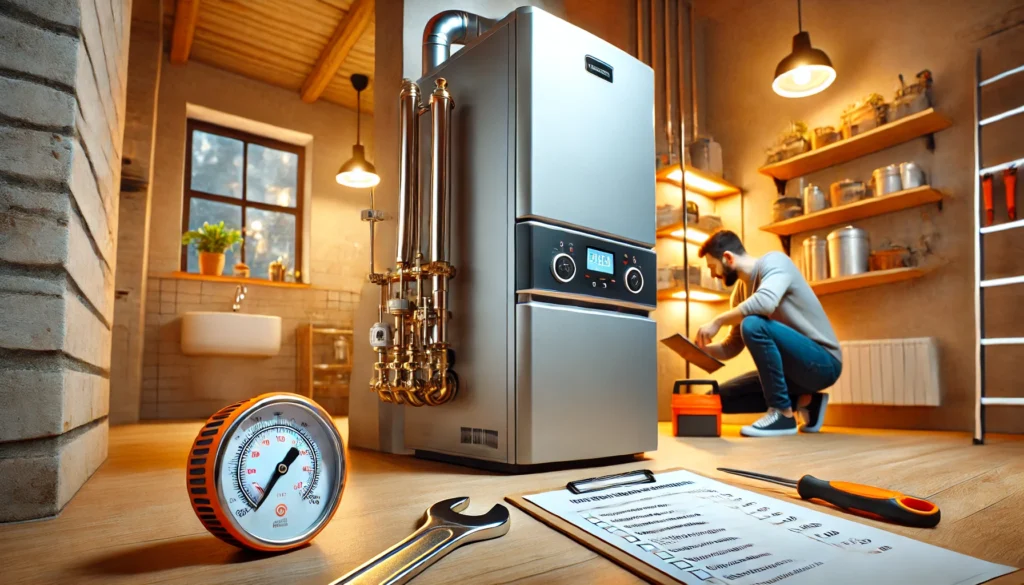
How to Properly Maintain Your Boiler Throughout the Year

Your boiler is the heart of your home’s heating system, especially during the colder months. Regular maintenance not only ensures it operates efficiently but also extends its lifespan and helps you avoid costly repairs. This guide covers practical tips and techniques to keep your boiler in top condition year-round.
1. Schedule an Annual Service
A professional service is essential to identify potential issues before they escalate. Qualified engineers can check for leaks, test the pressure, and ensure all components are functioning safely.
Benefits:
- Keeps your boiler running efficiently.
- Validates warranties (if applicable).
- Reduces the risk of carbon monoxide leaks.
Tip: Always hire a Gas Safe registered engineer for servicing.
2. Bleed Your Radiators
Trapped air in radiators can reduce your boiler’s efficiency, making it work harder than necessary. Bleeding radiators ensures consistent heating throughout your home.
How to Bleed Radiators:
- Turn off the heating system and let it cool.
- Use a radiator key to open the bleed valve.
- Close the valve once water starts flowing steadily.
Frequency: Twice a year or when radiators feel cooler at the top than the bottom.
3. Monitor Boiler Pressure
A boiler operating at the correct pressure ensures optimal performance. Most boilers function best between 1 and 1.5 bar.
How to Check and Adjust Pressure:
- Locate the pressure gauge on your boiler.
- If the pressure is low, use the filling loop to top it up.
- For high pressure, bleed the radiators or consult an engineer.
Tip: Check the pressure every few months or after bleeding radiators.
4. Keep the Area Around the Boiler Clear
Ensure there’s enough ventilation and avoid storing items near your boiler. Obstructed airflow can affect its performance and increase the risk of overheating.
Tip: Keep at least 30cm of clearance around the boiler for safety and easy access during inspections.
5. Insulate Pipes to Prevent Freezing
During winter, external pipes, such as the condensate pipe, are prone to freezing. Frozen pipes can cause your boiler to shut down.
Prevention Tips:
- Wrap pipes with lagging or insulation.
- Keep your heating on low during freezing conditions.
What to Do If Pipes Freeze:
- Use warm (not boiling) water to thaw the pipe.
- Restart the boiler once the blockage is cleared.
6. Check for Leaks and Unusual Noises
Leaks or strange noises like banging or whistling can indicate problems with your boiler. Common causes include pressure issues, air in the system, or failing components.
Action Steps:
- Inspect for visible leaks around the boiler and connected pipes.
- Listen for unusual sounds and note when they occur.
- Contact a professional if issues persist.
7. Test the Thermostat Regularly
A faulty thermostat can lead to inefficient heating and wasted energy. Check that it responds correctly to temperature adjustments and maintains your preferred settings.
Tip: Consider upgrading to a smart thermostat for better control and energy savings.
8. Flush the System to Remove Sludge
Over time, sludge and debris can build up in your heating system, reducing efficiency and causing blockages. A professional power flush can restore your system’s performance.
When to Flush:
- Radiators heat unevenly despite bleeding.
- Boiler makes gurgling noises.
9. Test the Carbon Monoxide Alarm
A boiler that isn’t functioning correctly can produce carbon monoxide, a colourless, odourless, and potentially deadly gas.
Maintenance Tips:
- Install a carbon monoxide alarm near your boiler.
- Test the alarm regularly and replace batteries as needed.
Tip: If the alarm sounds, turn off the boiler, ventilate your home, and call a professional immediately.
10. Use Your Boiler Efficiently
Operating your boiler efficiently reduces wear and tear, prolonging its lifespan.
Energy-Saving Tips:
- Set your thermostat to 18–21°C for a comfortable yet energy-efficient temperature.
- Use timer settings to heat your home only when needed.
- Consider upgrading to a modern, energy-efficient boiler if yours is over 10 years old.
Maximise Your Boiler’s Performance
Proper boiler maintenance is a year-round commitment that ensures reliable heating, lowers energy costs, and reduces the risk of breakdowns. By following these simple yet effective tips, you can keep your boiler in excellent condition and enjoy a warm, comfortable home throughout the year. Invest in professional servicing and adopt proactive habits to avoid unexpected repairs and extend your boiler’s lifespan.
4o